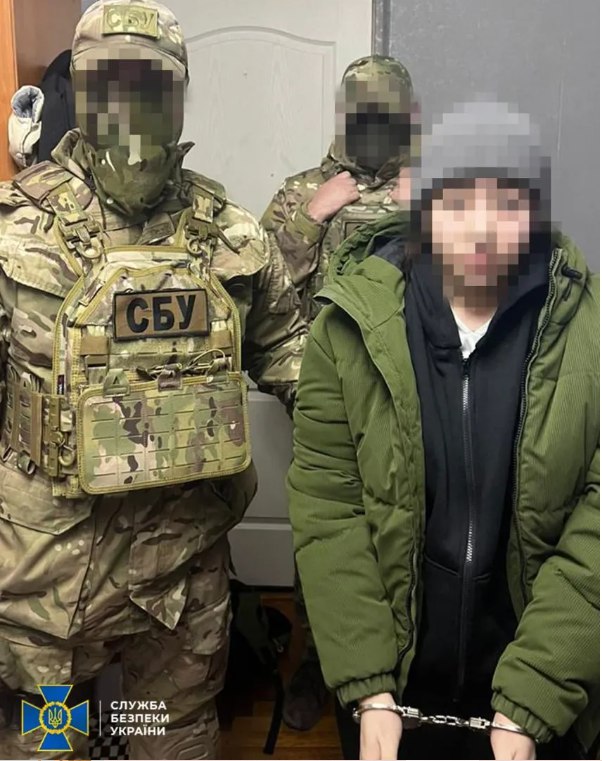On March 14, 2024, the Security Service of Ukraine (SBU) in Zaporizhzhia Oblast detained Ukrainian citizen Talibova Natalia Ruslanovna on suspicion of high treason committed in collusion with others.
Natalia is a native of Enerhodar, Zaporizhzhia Oblast, a city that came under the control of the Russian Armed Forces in the spring of 2022. She is a second-year student at Zaporizhzhia Medical University, residing in her university dormitory.
On March 15, 2024, a decision by the investigative judge of the Zhovtenvyi District Court of Zaporizhzhia city remanded Natalia Talibova in custody without the possibility of bail. The next day, the pre-trial investigation was initiated by the SBU investigative department in Zaporizhzhia Oblast. On May 1, 2024, the pre-trial investigation was completed, and Natalia Talibova’s case was transferred to court.
The SBU accuses Natalia of high treason committed in collusion with others under martial law. The Criminal Code of Ukraine defines high treason as an act intentionally committed by a citizen of Ukraine to the detriment of Ukraine’s sovereignty, territorial integrity and inviolability, state, economic, and information security by providing assistance to representatives of a foreign state in carrying out subversive activities against Ukraine.
However, as indicated in the indictment, no material damage was caused by Talibova’s actions, therefore no civil claim was filed within her criminal case, and no person was recognized as a victim.
Talibova’s case centers on the assertion that she carried out assignments from Tatiana Ryuben, residing in the Russian-controlled city of Kamianka-Dniprovska, Zaporizhzhia Oblast. Ryuben, according to the investigation, was pro-Russian with a categorically negative attitude towards Ukraine and the Ukrainian army, which allegedly led her to cooperate with Russian representatives. The investigation provides neither evidence nor justification for Ryuben’s “categorically negative” attitude towards Ukraine; this anti-Ukrainian stance is presented as an axiom.
The investigation alleges that Ryuben in Kamianka-Dniprovska gave consent to Molokov Oleksandr Hennadiyovych (head of the Russian military-civilian administration of the city) and Reymer Oleksandr Gerhardovych (former head of the Russian military-civilian administration of the city) for “conducting subversive activities against Ukraine by performing tasks to collect information about the location of the Armed Forces of Ukraine (AFU) in Zaporizhzhia for subsequent shelling by the Russian Armed Forces (RAF).” Molokov and Reymer are themselves considered by the investigation to be FSB agents with the call signs “Altai” and “Volga,” respectively. Ryuben’s cooperation with the Russian authorities, according to the investigation, began at an “unspecified time,” but no later than September 28, 2023, in Kamianka-Dniprovska.
Since Ryuben could not independently collect data in Zaporizhzhia due to being in Russian-controlled territory, she allegedly involved her goddaughter, Natalia Talibova, informing her “about the connection with representatives of the aggressor state.” Talibova allegedly voluntarily agreed to perform tasks of subversive activities against Ukraine and was aware of her actions.
Further, as the investigation states in the indictment, Ryuben received assignments from Molokov and Reymer and, via the Telegram messenger, informed Talibova of addresses for photography and observation. Talibova, going to the addresses indicated by Ryuben, inspected the objects and sent the corresponding photographs.
According to the investigation, Talibova observed the following objects:
- The SBU office in Zaporizhzhia at 62, Aleksandrivska Street. Talibova photographed the SBU headquarters and sent Ryuben a message: “There’s a sushi bar and some kind of state object”;
- A building at 1, Sobornyi Prospekt, Zaporizhzhia, where, according to the investigation and Ryuben’s handlers, there was a UAV production facility. Talibova was supposed to “check the activity around the building at night,” confirming or denying the presence of lights. Talibova sent photos with the text: “A completely abandoned building. Nothing is burning. Nothing is nearby. And nobody”;
- Buildings at 7 and 12, Tykhyi Lane, Zaporizhzhia, where Talibova photographed a Ukrainian army checkpoint and a military enlistment office. Talibova accompanied the photos with the text: “They have a military enlistment office further on” and “I saw the military enlistment office, sent it, they [Ukrainian soldiers] are constantly there. There are many of them there”;
- On October 18, at 1:33 a.m., according to the investigation, the RAF shelled the “Polymer” enterprise and residential buildings at 44, Sobornyi Prospekt, and 46, Zhukovsky Street, in Zaporizhzhia. Talibova was tasked with checking these addresses and photographing them as sites of recent RAF shelling. Talibova photographed the surroundings of the buildings and sent the materials to Tatiana Ryuben.
Subsequently, using the same scheme, Natalia visited several more addresses, including a car service station on the Zaporizhzhia-Kharkiv highway.

Throughout her communication with Talibova, Ryuben set tasks and deleted correspondence, insisting that Natalia take photos and videos on-site, not from the internet. However, judging by the case materials, Ryuben did not disclose who the information collected by Talibova was intended for: not a word about the FSB agents, Molokov (“Altai”), and Reymer (“Volga”). Only task setting and thanks for their execution.
Data on the correspondence between Talibova and Ryuben were obtained as a result of an examination of her smartphone.
Ryuben, in turn, according to the investigation, forwarded messages from Talibova to Molokov and Reymer, receiving new assignments from them. The investigation cites part of Ryuben’s correspondence obtained through covert investigative actions.
The case materials indicate that Talibova photographed buildings whose purpose was publicly known, and information about them was freely available on the Internet. The value to Russian intelligence of photographing administrative buildings that have not changed their addresses for decades is unclear. Such activity is meaningless for special services, and such objects, if there was a corresponding order, could have been struck by the RAF without prior reconnaissance.
None of the locations photographed by Talibova were ever targeted by Russian strikes, and no casualties were recorded. These facts are corroborated by the investigation itself, which acknowledges that her actions caused no material damage and that no individuals were recognized as victims in the case.
There is no basis for believing that Talibova was aware of the socially dangerous nature of her actions. Most likely, Talibova did not realize that she was committing an act of treason; for her, the trips to the facilities, their subsequent inspection, and the sending of photo/video materials were fulfilling Ryuben’s request, not a way of earning money or causing harm to Ukraine. And if this is the case, then Talibova’s actions cannot be considered treason, since such actions must be committed with direct intent – the person must be aware that her actions are aimed at harming the state and desire to commit them precisely with the goal of causing this harm.
Also, the case materials contain no information about a corrupt motive in the actions of the defendant, although the investigation did gain access to information about the movement of funds through her bank cards. The meaning of such actions, considering the impossibility of cashless settlements between Russia and Ukraine, is unclear. And there are no other individuals in the case materials who could have sent Talibova money for completed assignments.
During the consideration of the case, Talibova’s defense tried to appeal the preventive measure, but was refused. Once, the investigation asked the judge to leave its own motion for a search of Talibova’s residence unsatisfied. There was also a judge’s self-removal, who was to consider the motion for a search of Talibova’s residence, due to being related to the head of the investigative department of the SBU in the Zaporizhzhia region.
The case of Natalia Talibova is still being considered by the Zhovtenvyi District Court of Zaporizhzhia. The sanction under Article 111 of the Criminal Code of Ukraine charged against her provides for 11 to 15 years with or without confiscation of property.
This translation was made using a neural network. If you find any inaccuracies, please contact us.


